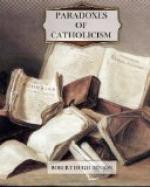For, as she turns her eyes from God to men, she sees there immortal souls, made in the image of God and made for Him and Him alone, seeking to satisfy themselves with Creation instead of with the Creator. She hears how the world preaches the sanctity of the temperament, and the holiness of the individual point of view, as if there were no Transcendent God at all and no objective external Revelation ever made by Him. She sees how men, instead of seeking to conform themselves to God’s Revelation of Himself, attempt rather to conform such fragments of that Revelation as have reached them to their own points of view; she listens to talk about “aspects of truth” and “schools of thought” and the “values of experience” as if God had never spoken either in the thunders of Sinai or the still voice of Galilee.
Is it any wonder, then, that her Proselytism appears to such a world as extravagant as her Contemplation, her passion for men as unreasonable as her passion for God, when that world sees her bring herself from her cloisters and her secret places to proclaim as with a trumpet those demands of God which He has made known, those Laws which He has promulgated, and those rewards which He has promised? For how can she do otherwise who has looked on the all-glorious Face of God and then on the vacant and complacent faces of men—she who knows God’s infinite capacity for satisfying men and men’s all but infinite incapacity for seeking God—when she sees some poor soul shutting herself up indeed within the deadly and chilly walls of her own “temperament” and “individual point of view,” when earth and heaven and the Lord of them both is waiting for her outside?
The Church, then, is too much interested in men and too much absorbed in God. Of course she is too much interested and too much absorbed, for she alone knows the value and capacity of both; she who is herself both Divine and Human. For Religion, to her, is not an elegant accomplishment or a graceful philosophy or a pleasing scheme of conjectures. It is the fiery bond between God and man, neither of whom can be satisfied without the other, the One in virtue of His Love and the other in virtue of his createdness. She alone, then, understands and reconciles the tremendous Paradox of the Law that is Old as well as New. Thou shalt love the Lord thy God with thy whole heart ... and thy neighbour as thyself .
VI
FAITH AND REASON
Whosoever shall not receive the kingdom of God as a little child shall not enter into it.—MARK X. 15.
Some things hard to be understood, which the unlearned and the unstable wrest, as also the other Scriptures, to their own perdition.— II PET. III. 16.
There are two great gifts, or faculties, by which men attain to truth: faith and reason. From these two sides, therefore, come two more assaults upon the Catholic position, a position which itself faces in both these directions. On the one side we are told that we believe too simply, on the other that we do not believe simply enough; on the one side that we reason too little, on the other that we do not reason enough. Let us set out these attacks in order.




